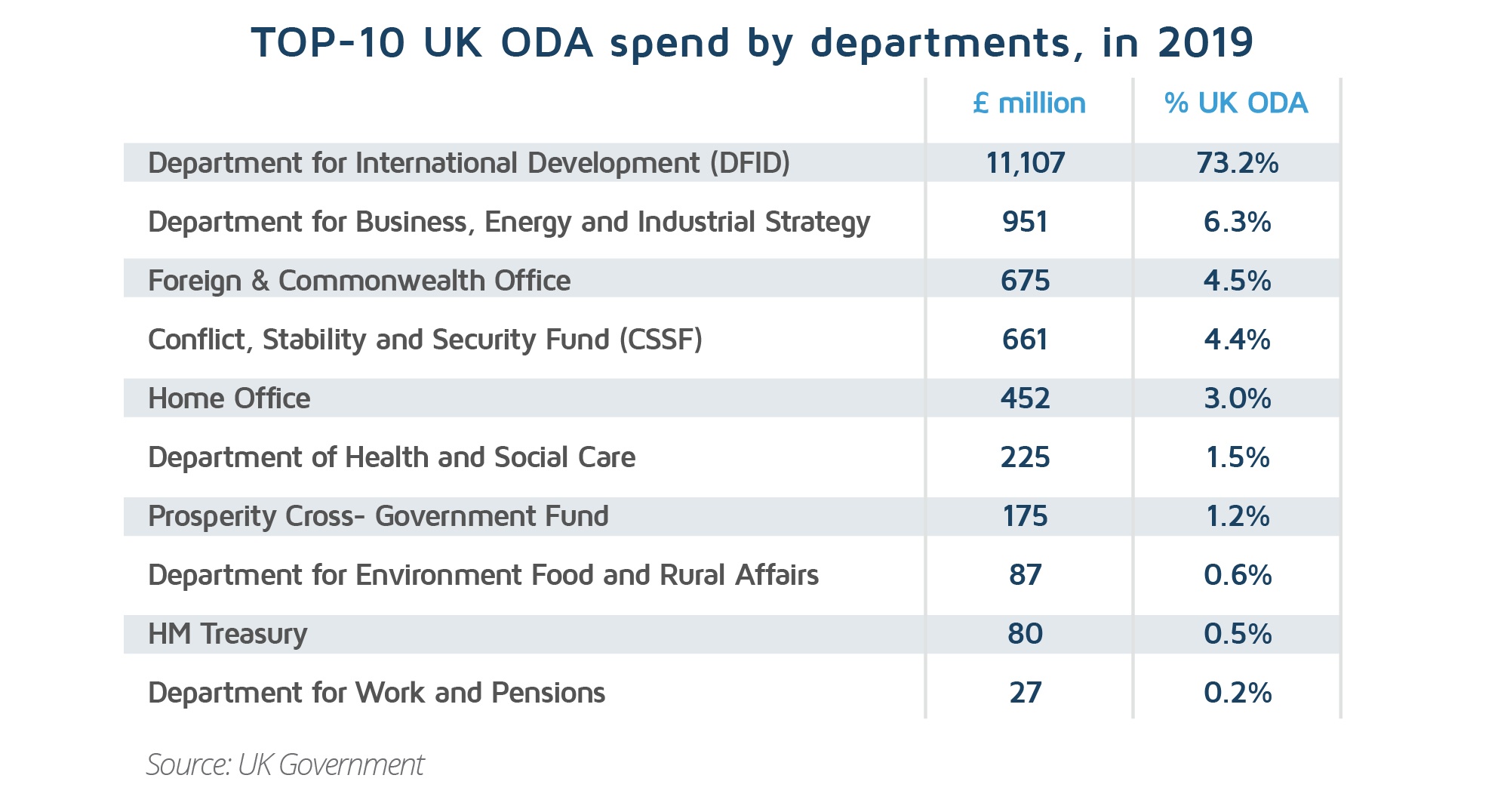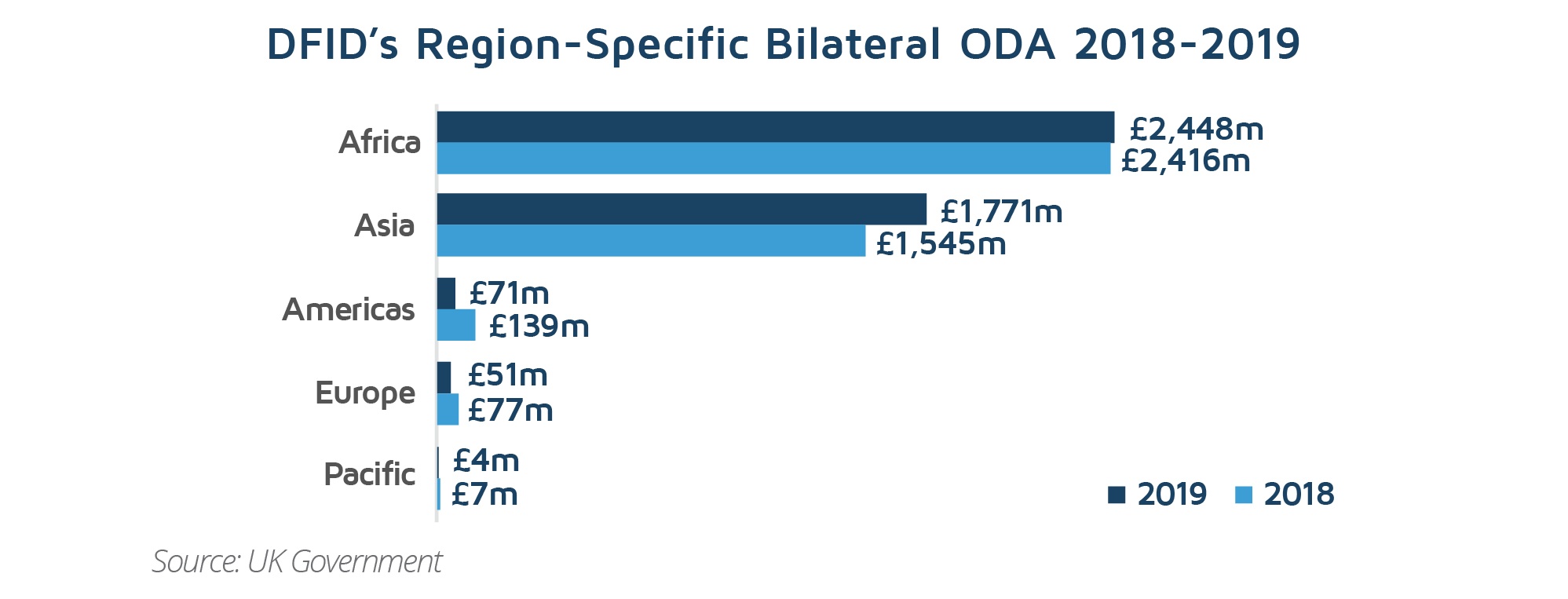The United Kingdom (UK) spent nearly £15.2 billion on Official Development Assistance (ODA) in 2019, ranking it among the TOP-3 Development Assistance Committee donor countries. This amount is over £600 million more than the 2018 figure. At the same time, Her Majesty’s government has maintained the targeted 0.7% to gross national income (GNI) ratio, considered to be a long-time United Nations milestone for developed countries. DevelopmentAid scanned the latest available data on the UK’s ODA in 2019 to offer its readers a comprehensive overview.
Preliminary UK Aid figures show that the share of bilateral ODA increased in 2019 by almost 3% and reached 66.6%. Core contributions to multilateral channels accounted for the remaining 33.4% – the lowest multilateral share in the last ten years.
The bilateral channel is generally used to send ODA to specific countries, regions or programs. Core multilateral ODA is funding from governments to multilateral organizations such as the World Bank International Development Association, for example.
In 2019, the UK spent £5 billion on multilateral ODA which is 4.3% (£228 million) less than in 2018. The decrease was in part due to a smaller annual contribution to the International Development Association (IDA).
Almost £1.5 billion of the £10.5 billion funneled through bilateral channels was spent on humanitarian assistance. This represents an increase of £208 million compared to 2018. According to official sources, this increase was partly driven by the response to crises such as that experienced by Yemen.
A little over 73% of the total UK ODA was funneled through the Department for International Development (DFID). Despite the DFID’s ODA spending having increased, its share of total ODA decreased by 1.7% compared to 2018 and almost 7% when compared to 2013.
At the end of 2019, DevelopmentAid analyzed the monthly spending reports issued by DFID and compiled a comprehensive review of the organization’s most important partners during the period January to September 2019.

According to provisional data published by the UK government, the Department for Business, Energy and Industrial Strategy (BEIS) spent £951 millions of the UK’s ODA in 2019. This figure represents an increase of £101 million, or 11.8%, compared to 2018. This included funding for research activities which increased by £81 million and spending on climate-related programs which increased by £21 million.
With data on the breakdown of region-specific bilateral ODA from government departments other than DFID not available within the provisional release, it’s worth reporting the information that is available for the UK’s aid contributor.
In 2019, DFID region-specific bilateral ODA was £4.35 billion, compared to £4.18 billion in 2018. However, whilst the overall amount increased, the total bilateral ODA share decreased from 65.6% (2018) to 62.5% (2019). This is explained by increased spending through centrally funded programs and non-region-specific bilateral ODA.
Africa received almost £2.5 billion, being the largest recipient of bilateral DFID region-specific ODA in 2019. Asia received £1.8 billion from DFID – an increase of £225 million compared to 2018. This also represents an increase in the share of UK ODA which was partly driven by humanitarian funding in Bangladesh and Yemen.

Lower spending in the Caribbean triggered an almost 50% decrease of the UK ODA sent to the Americas with the region receiving £71 million of DFID bilateral ODA, £67 million less compared to 2018.
Bilateral ODA spending by DFID on projects not assigned to any single recipient region amounted to £2.6 billion in 2019, an increase of £416 million compared to 2018. This represents almost 37.5% of DFID’s total bilateral ODA spend – a 3.1% increase compared to 2018.
DevelopmentAid is the world’s leading provider of business intelligence information in the international development sector. Follow DFID, the biggest UK aid contributor and one of the most respected world development agencies, alongside other international development giant organizations, when you become a member.

